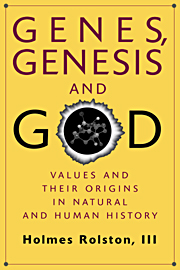Book contents
- Frontmatter
- Contents
- Preface
- Chapter 1 Genetic Values: Diversity and Complexity in Natural History
- Chapter 2 Genetic Identity: Conserved and Integrated Values
- Chapter 3 Culture: Genes and the Genesis of Human Culture
- Chapter 4 Science: Naturalized, Socialized, Evaluated
- Chapter 5 Ethics: Naturalized, Socialized, Evaluated
- Chapter 6 Religion: Naturalized, Socialized, Evaluated
- References
- Index
Chapter 2 - Genetic Identity: Conserved and Integrated Values
Published online by Cambridge University Press: 05 June 2012
- Frontmatter
- Contents
- Preface
- Chapter 1 Genetic Values: Diversity and Complexity in Natural History
- Chapter 2 Genetic Identity: Conserved and Integrated Values
- Chapter 3 Culture: Genes and the Genesis of Human Culture
- Chapter 4 Science: Naturalized, Socialized, Evaluated
- Chapter 5 Ethics: Naturalized, Socialized, Evaluated
- Chapter 6 Religion: Naturalized, Socialized, Evaluated
- References
- Index
Summary
Evolutionary genesis requires information to create the display of diverse and complex forms of life on Earth, achieved by locating value in organismic “selves”, with these selves integrated into families, populations, and species lines; integrated as well into ecosystems in which organisms must have their niche, habitat, and adapted fitness. The genesis thus requires encapsulated and localized identity, both inside and in place. The “self” question, much discussed in biology, is, philosophically speaking, an “identity” question, which proves also to be an “integration” question. The question is of “belonging,” what are the gene's and the self's proper and suitable role and place.
Although any analysis of identity in organisms must locate this significantly in the genes, this analysis soon reveals complex and multifaceted dimensions. Identity is a diverse, composite, developing, and far-reaching phenomenon and need not have a single a priori meaning for rocks, mountains, rivers, continents, genes, cells, organisms, families, populations, species, ecosystems, or persons and their societies. One must work out what identity means a posteriori to events. There is no particular cause to suppose that all identity is genetic, although we next examine that kind. With living things, questions of level mingle with questions of identity, which mingle with questions of persisting and perishing. Genetic identity, the focus of this chapter, is paired with genetic distribution and sharing, with which we concluded the previous chapter. Genetic identity must be located in “selves,” but this is only half the story; it cannot be confined there but must be copied and portioned out.
- Type
- Chapter
- Information
- Genes, Genesis, and GodValues and their Origins in Natural and Human History, pp. 54 - 107Publisher: Cambridge University PressPrint publication year: 1999



